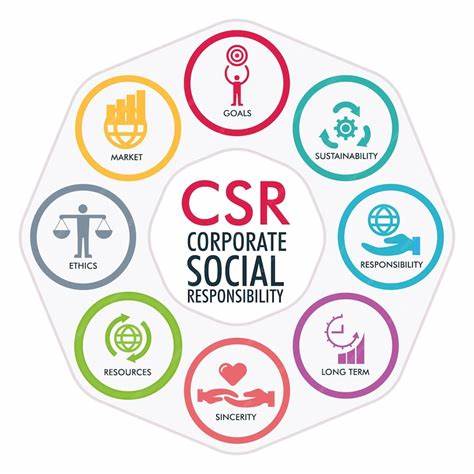Promoting Corporate Social Responsibility Initiatives: A Deep Dive into Business Development
Introduction
Corporate Social Responsibility (CSR) has evolved from a peripheral aspect of business operations to a core component of corporate strategy. As stakeholders increasingly demand that companies operate ethically and contribute to societal well-being, businesses have begun to recognize the value of integrating CSR into their overall development plans. This article delves into the importance of promoting CSR initiatives, explores how these initiatives can drive business development, and offers recommendations for companies seeking to enhance their CSR efforts.

The Growing Importance of Corporate Social Responsibility
CSR refers to the efforts made by companies to contribute positively to society beyond their financial obligations. These efforts can take various forms, including environmental sustainability programs, charitable donations, ethical labor practices, and community engagement activities. The growing importance of CSR is driven by several factors:
-
Consumer Expectations: Modern consumers are more informed and socially conscious. They prefer to support brands that demonstrate a commitment to ethical practices and social good. A study by Cone Communications found that 87% of consumers will purchase a product because a company advocated for an issue they care about, while 76% will refuse to buy from a company if it supports an issue contrary to their beliefs.
-
Investor Preferences: Investors are increasingly considering Environmental, Social, and Governance (ESG) criteria when making investment decisions. Companies that prioritize CSR tend to attract more investment from those who are looking for long-term, sustainable growth.
-
Employee Engagement: Employees, especially younger generations, want to work for companies that align with their values. A strong CSR program can enhance employee morale, reduce turnover, and attract top talent.
-
Regulatory Pressures: Governments and regulatory bodies around the world are implementing stricter laws and guidelines around corporate responsibility, particularly in areas like environmental impact and human rights.
How CSR Initiatives Drive Business Development
CSR initiatives can significantly contribute to business development by enhancing a company's reputation, building customer loyalty, and fostering innovation. Here’s how:
-
Brand Differentiation and Reputation Building: Companies that actively engage in CSR distinguish themselves from competitors. A strong CSR program can elevate a brand’s reputation, making it more attractive to consumers who prioritize ethical consumption. This reputation can also shield companies from negative publicity during crises, as consumers may be more forgiving of a company they perceive as socially responsible.
-
Customer Loyalty and Market Expansion: CSR initiatives can foster customer loyalty by resonating with consumers’ values. For instance, a company that implements eco-friendly practices may attract environmentally conscious consumers, thereby expanding its market base. Additionally, CSR can open doors to new markets, particularly in regions where social and environmental issues are of paramount concern.
-
Innovation and Competitive Advantage: CSR can drive innovation by challenging companies to develop new products, services, or business models that address social or environmental issues. For example, a commitment to reducing carbon emissions might lead to the development of more energy-efficient products or processes, giving the company a competitive edge in a market that increasingly values sustainability.
-
Risk Management and Compliance: By proactively addressing social and environmental risks, companies can reduce the likelihood of regulatory fines, legal disputes, and reputational damage. A well-structured CSR program can also help companies anticipate and adapt to regulatory changes, ensuring long-term compliance and stability.
-
Enhanced Stakeholder Relationships: Engaging in CSR strengthens relationships with various stakeholders, including customers, employees, investors, and communities. Strong stakeholder relationships are vital for business success, as they can lead to greater collaboration, support during challenges, and sustained business growth.

Recommendations for Promoting CSR Initiatives
To effectively promote and integrate CSR into business development, companies should consider the following recommendations:
-
Align CSR with Core Business Strategy: CSR initiatives should be closely aligned with the company’s core business strategy. This ensures that CSR is not seen as an add-on but as an integral part of the company’s mission and operations. For example, a technology company might focus on digital inclusion or data privacy as part of its CSR strategy.
-
Engage Stakeholders in CSR Planning: Involve key stakeholders, including employees, customers, suppliers, and community members, in the development of CSR initiatives. This engagement ensures that the initiatives are relevant and impactful, and it builds stakeholder buy-in.
-
Set Measurable Goals and Track Progress: Establish clear, measurable goals for CSR initiatives and regularly track progress. This not only demonstrates the company’s commitment to CSR but also allows for adjustments to be made to improve outcomes. Publicly reporting on CSR progress can enhance transparency and accountability.
-
Communicate CSR Efforts Effectively: Companies should effectively communicate their CSR efforts to both internal and external audiences. This can be done through annual CSR reports, social media campaigns, and other communication channels. Highlighting the positive impact of CSR initiatives can strengthen the company’s reputation and inspire others to follow suit.
-
Leverage Partnerships for Greater Impact: Collaborating with NGOs, government agencies, and other organizations can amplify the impact of CSR initiatives. Partnerships can provide additional resources, expertise, and credibility, making CSR efforts more effective and far-reaching.
-
Encourage Employee Participation in CSR: Employee involvement in CSR initiatives can enhance their sense of purpose and connection to the company. Companies can encourage participation by offering volunteer opportunities, matching employee donations, or creating CSR committees that include employee representatives.
Connecting CSR to Business Development
The integration of CSR into business development is not just beneficial; it is essential in today’s business environment. Companies that fail to prioritize CSR risk falling behind their competitors, losing customer trust, and facing increased regulatory scrutiny. On the other hand, those that embrace CSR as a key component of their business strategy can achieve sustainable growth, innovation, and long-term success.
CSR also plays a critical role in building resilience, especially in times of crisis. During the COVID-19 pandemic, companies with strong CSR programs were better equipped to navigate challenges, support their communities, and maintain stakeholder trust. As businesses look to the future, CSR will continue to be a driving force in shaping corporate reputation and ensuring business continuity.
Conclusion
Promoting corporate social responsibility is not just about doing the right thing; it is about doing the smart thing for business development. By aligning CSR with core business strategies, engaging stakeholders, and setting measurable goals, companies can create value for society while also driving their own growth. As CSR continues to evolve, it will undoubtedly play an increasingly central role in defining the success and sustainability of businesses worldwide.
References
- Cone Communications. (2017). CSR Study: CSR is No Longer Optional. Cone Communications.
- Harvard Business Review. (2020). The Competitive Advantage of Corporate Philanthropy. Harvard Business Review.
- KPMG. (2022). Global Trends in Sustainability Reporting. KPMG International.
- McKinsey & Company. (2021). ESG and Corporate Financial Performance: An Empirical Analysis. McKinsey & Company.
- World Economic Forum. (2021). The Future of Corporate Social Responsibility. World Economic Forum.
